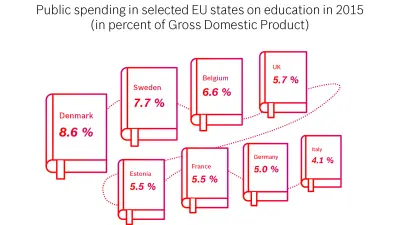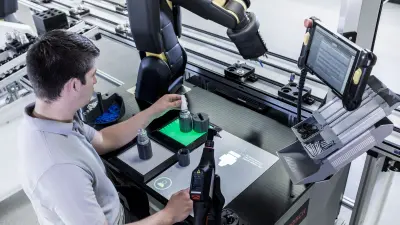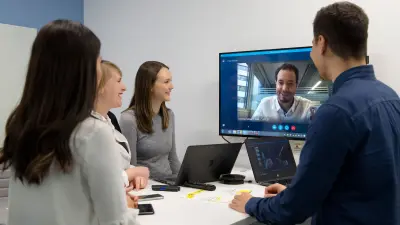“Get learning, or stay analog.”

2017-12-18
Investment in education has never been so essential as in the present age of digitalization.
An appeal to politics, business — and every individual.
by Dr. Volkmar Denner

There is a new name for our modern times: digitalization. It is not enough to see this simply as a technological phenomenon affecting the economy, for it also raises a new social issue. How can we avert a “digital divide” in our society? Of course, not everyone has to be a software specialist, but how can we give as many people as possible the wherewithal to participate knowledgeably in the connected world of data? Education — far too often a fairweather subject in public debate — is taking on urgency in the digitalization era. All of us have to embrace learning — either we get learning, or we will stay analog.
Education seems always to be someone else’s problem
Everyone has an opinion about education. Unfortunately, however, it appears that most of us see it as someone else’s problem. Nowhere is there a greater gap between ideals and reality as in the question of the best investment in the future. This applies to politics and, if we are honest, it applies in almost equal measure to our own careers.

Education spending − Germany is no better than average
Our country needs more highly qualified young talent, we say, to stay ahead of international competition. And in a country like Germany, it is commonly believed that education is a key raw material. But in terms of education spending as a share of GDP, however, this country has been mid-table among the advanced economies for many years now.
4 minutes a day – the reality of lifelong learning
Lifelong learning is essential, we say, also as a way of advancing our personal careers. But the truth is that people aged 30 to 44 spend just nine minutes a day on average on improving their qualifications. And for people aged 45 to 64, the figure is even lower — only four minutes.
It’s up to schools to provide basic digital education
In this difficult environment, companies like Bosch have to extend their knowledge, be it of the internet of things, be it of artificial intelligence. We expect politics to pay more than lip service to education, but we can’t wait for this to happen. Even a successful company has to embrace learning more than ever. It has to see itself as a learning company. But first things first. It is above all for further education that more initiative is needed on the part of individuals and companies. But it is still up to our schools to provide basic digital training. We must not absolve politicians of their duty to spend more on education.

More education, more jobs – what are politicians waiting for?

But how can such spending win the day when austerity and debt reduction are the priority for so many countries? On this subject, it’s worth citing a study by the Bertelsmann foundation in Germany. It found that education spending generates the greatest return of any public spending programs. Within just a few years, it reaps a multitude of benefits: higher growth, more equality of opportunity, less unemployment. In the end, therefore, the spending is also fiscally efficient, since its long-term positive effect on national debt is greater than immediate spending cuts. As the authors of the study point out, sound budgets and investments in the future do not have to be mutually exclusive. So what are politicians waiting for? It time to stop beating around the bush and give education the priority they’ve been promising for so long.
“In the digital world, people who have achieved success in their careers cannot afford to rest on their laurels and refuse to learn anything new.”
Learning is a personal issue – not least for the Bosch CEO
Conversely, declaring education to be solely a matter for governments, to be something that has little to do with us personally, would be making it too easy on ourselves. Learning isn’t just a political issue, it’s a personal one as well. And it’s more than just a challenge our children have to face. In the digital world, people who have achieved success in their careers – especially such people, in fact — cannot afford to rest on their laurels and refuse to learn anything new. For me as Bosch CEO, this means continuing to read specialist literature, taking online courses, and engaging with others — not just business partners, but also scientists and our own experts. And this engagement involves asking questions, listening, and learning. Or to put it another way: the more successful the company, the more alert its executives have to be to change, and the more they have to preserve their curiosity. More than anything else — and this is something I firmly believe — they have to instill this sense in their teams.
Not just nice to have − the idea of Bosch as a learning company
Admittedly, after a day at work, not every associate will always still have the energy to learn. This makes it all the more important to see working and learning as a whole, and to combine the two. This can only work if further training is no longer seen as something that is merely “nice to have” — a seminar every so often, then back to routine. When we speak about a learning company at Bosch, we mean more. We want further training to be an integral part of company strategy. Without it, such a strategy cannot come to fruition. We want to — indeed, we have to — take our team with us as we move into new areas such as electromobility and connectivity. And when we say “take them with us,” we mean qualify them. And since associates are also responsible for their further training, they can also take the initiative themselves, depending on the needs at their workplace.

New learning forums on social media — “Working out loud”

It is this that is giving rise to new forms for self-organized learning on our social media. “Working out loud,” for example, is a forum in which five associates meet once a week for three months in order to improve their knowledge of a subject they have chosen themselves. There are already more than 200 such learning circles at Bosch, and their number is growing rapidly. Initiatives such as this show just how much energy can be set free by digital learning. The decisive factor is “learnagility,” the ability to generate knowledge quickly and efficiently across departmental and national boundaries, and then to share it. Agility such as this is indispensable in a company that is in the midst of its biggest ever transformation.
“More than ever, there can be no affluence for all without education for all.”
Deliberately cultivating our own engineers
Bosch can still recruit sufficient software engineers in its efforts to put itself at the forefront of the connectivity megatrend. But in the future, new recruits alone will not be enough to cover the need for specialists. What could be more logical than deliberately cultivating our own engineers? For example, we could use intensive training courses to enhance our mechanical engineers’ software competencies. And in the end, what is a matter of technological and business expediency for a company is also socially meaningful. Internet of things, sensor technology, robotics, artificial intelligence — technological change is so rapid that we have to take care not to leave huge swathes of the population behind. In times of digital connectivity, education is the key to averting a new social divide. More than ever, there can be no affluence for all without education for all.


